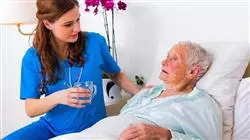University certificate
Scientific endorser

The world's largest faculty of nursing”
Introduction to the Program
A complete program that will help you learn the main techniques and therapies to care for cancer patients in a comprehensive and professional manner”

Nursing care for cancer patients and their families is a great challenge, due to the effect that this disease can have on patients. Therefore, the specific treatments required by these patients, their side effects and their needs make this specialty essential in the field of nursing.
The Professional master’s degree in Oncology Nursing includes up-to-date and expert-reviewed material that will allow students to acquire transversal skills in a continuously evolving nursing discipline. Unlike other postgraduate programs, the content has been structured to provide the student with multidisciplinary specialization in medical, nutritional, psychological and rehabilitative aspects, always from a nursing perspective. All this will make the professional a key member of the healthcare team.
The combination of multimedia resources, real clinical cases and up-to-date content will complete the specialization of the student, who will also acquire skills in communication, psychosocial approach and research, all of which is essential to provide quality care based on scientific research.
The up-to-date content of this Professional master’s degree and its integrative approach will provide students with a comprehensive vision of all aspects related to Oncology Nursing. The course content will cover the diverse needs of cancer patients, whose specific conditions require personalized attention.
Both the design of the program and the teaching material used will facilitate the understanding of concepts, and the practical cases will help students implement what they have learned into their clinical practice. Therefore, the Professional Master's Degree will provide immersive learning to help professionals gain the specialized skills they need to face real situations in their daily professional practice.
Don't miss the opportunity to study at one of the largest private online university in the world”
This Professional master’s degree in Oncology Nursing contains the most complete and up-to-date education program on the market. The most important features of the program include:
- The development of case studies presented by experts in Oncology Nursing
- The graphic, schematic, and eminently practical contents with which they are created provide scientific and practical information on the disciplines that are essential for professional practice
- Latest developments in Oncology Nursing
- Practical exercises where the self-assessment process can be carried out to improve learning
- Special emphasis on innovative methodologies in Oncology Nursing
- Theoretical lessons, questions to the expert, debate forums on controversial topics, and individual reflection assignments
- Content that is accessible from any fixed or portable device with an Internet connection
This Professional master’s degree is the best investment you can make when choosing a refresher program to update your existing knowledge in Oncology Nursing”
The teaching staff includes professionals from the field of Oncology Nursing, who contribute their experience to this program, as well as renowned specialists from leading societies and prestigious universities.
The multimedia content, developed with the latest educational technology, will provide the professional with situated and contextual learning, i.e., a simulated environment that will provide an immersive experience programmed to learn in real situations.
This program is designed around Problem-Based Learning, whereby the professional must try to solve the different professional practice situations that arise throughout the program. For this purpose, the professional will be assisted by an innovative interactive video system created by renowned and experienced experts in Oncology Nursing with extensive experience.
This program has the best teaching material, which will provide youn with a contextual study that will facilitate your learning"

This 100% online Professional master’s degree will allow you to combine your studies with your professional work while increasing your knowledge in this field"
Why study at TECH?
TECH is the world’s largest online university. With an impressive catalog of more than 14,000 university programs available in 11 languages, it is positioned as a leader in employability, with a 99% job placement rate. In addition, it relies on an enormous faculty of more than 6,000 professors of the highest international renown.

Study at the world's largest online university and guarantee your professional success. The future starts at TECH”
The world’s best online university according to FORBES
The prestigious Forbes magazine, specialized in business and finance, has highlighted TECH as “the world's best online university” This is what they have recently stated in an article in their digital edition in which they echo the success story of this institution, “thanks to the academic offer it provides, the selection of its teaching staff, and an innovative learning method aimed at educating the professionals of the future”
A revolutionary study method, a cutting-edge faculty and a practical focus: the key to TECH's success.
The most complete study plans on the university scene
TECH offers the most complete study plans on the university scene, with syllabuses that cover fundamental concepts and, at the same time, the main scientific advances in their specific scientific areas. In addition, these programs are continuously being updated to guarantee students the academic vanguard and the most in-demand professional skills. In this way, the university's qualifications provide its graduates with a significant advantage to propel their careers to success.
TECH offers the most comprehensive and intensive study plans on the current university scene.
A world-class teaching staff
TECH's teaching staff is made up of more than 6,000 professors with the highest international recognition. Professors, researchers and top executives of multinational companies, including Isaiah Covington, performance coach of the Boston Celtics; Magda Romanska, principal investigator at Harvard MetaLAB; Ignacio Wistumba, chairman of the department of translational molecular pathology at MD Anderson Cancer Center; and D.W. Pine, creative director of TIME magazine, among others.
Internationally renowned experts, specialized in different branches of Health, Technology, Communication and Business, form part of the TECH faculty.
A unique learning method
TECH is the first university to use Relearning in all its programs. It is the best online learning methodology, accredited with international teaching quality certifications, provided by prestigious educational agencies. In addition, this disruptive educational model is complemented with the “Case Method”, thereby setting up a unique online teaching strategy. Innovative teaching resources are also implemented, including detailed videos, infographics and interactive summaries.
TECH combines Relearning and the Case Method in all its university programs to guarantee excellent theoretical and practical learning, studying whenever and wherever you want.
The world's largest online university
TECH is the world’s largest online university. We are the largest educational institution, with the best and widest online educational catalog, one hundred percent online and covering the vast majority of areas of knowledge. We offer a large selection of our own degrees and accredited online undergraduate and postgraduate degrees. In total, more than 14,000 university degrees, in eleven different languages, make us the largest educational largest in the world.
TECH has the world's most extensive catalog of academic and official programs, available in more than 11 languages.
Google Premier Partner
The American technology giant has awarded TECH the Google Google Premier Partner badge. This award, which is only available to 3% of the world's companies, highlights the efficient, flexible and tailored experience that this university provides to students. The recognition as a Google Premier Partner not only accredits the maximum rigor, performance and investment in TECH's digital infrastructures, but also places this university as one of the world's leading technology companies.
Google has positioned TECH in the top 3% of the world's most important technology companies by awarding it its Google Premier Partner badge.
The official online university of the NBA
TECH is the official online university of the NBA. Thanks to our agreement with the biggest league in basketball, we offer our students exclusive university programs, as well as a wide variety of educational resources focused on the business of the league and other areas of the sports industry. Each program is made up of a uniquely designed syllabus and features exceptional guest hosts: professionals with a distinguished sports background who will offer their expertise on the most relevant topics.
TECH has been selected by the NBA, the world's top basketball league, as its official online university.
The top-rated university by its students
Students have positioned TECH as the world's top-rated university on the main review websites, with a highest rating of 4.9 out of 5, obtained from more than 1,000 reviews. These results consolidate TECH as the benchmark university institution at an international level, reflecting the excellence and positive impact of its educational model.” reflecting the excellence and positive impact of its educational model.”
TECH is the world’s top-rated university by its students.
Leaders in employability
TECH has managed to become the leading university in employability. 99% of its students obtain jobs in the academic field they have studied, within one year of completing any of the university's programs. A similar number achieve immediate career enhancement. All this thanks to a study methodology that bases its effectiveness on the acquisition of practical skills, which are absolutely necessary for professional development.
99% of TECH graduates find a job within a year of completing their studies.
Professional Master's Degree in Oncology Nursing
The diagnosis of a neoplasm, especially if it is malignant, completely changes the paradigms of any person and his or her way of facing the world. Under these conditions, the support of the interpersonal circle that surrounds the patient is decisive, and this also includes the health professionals involved in the case. The Professional Master's Degree in Oncology Nursing developed by TECH Global University is the opportunity for all healthcare related personnel to complement their studies with a series of extremely useful knowledge for patients requiring palliative care and/or related to the management of cancer pathologies. In this program you will find all the theoretical and practical resources to strengthen your skills and develop new ones under the highest standards of the Hippocratic profession. All classes are taught in an exclusively online environment, which is why you will have complete autonomy in the schedules and intensity of the content. We know that the Nursing vocation is capable of transforming lives, so we want to make you an inspiring reference.
Learn about oncology care
It is the small, seemingly inconsequential actions that end up changing unfavorable paths to promising futures. For the wounded in combat during the Crimean War in the 19th century, this happened thanks to a woman who cared for them by making nightly rounds and who was nicknamed "the lady with the lamp". Her real name was Florence Nightingale, forerunner of modern Nursing and inspiration for Henri Dunant to found the Red Cross. Today, this branch of the health sciences is one of the great allies in the physical and emotional fight against an equally crude war: cancer; pinnacle of diseases, which in 2020 alone claimed the lives of nearly ten million people. Why not make a contribution by learning how to deal with this type of pathology? Our postgraduate program is the answer. Boost your path to humanistic excellence and career advancement by studying with the best online university you will find in the market.







